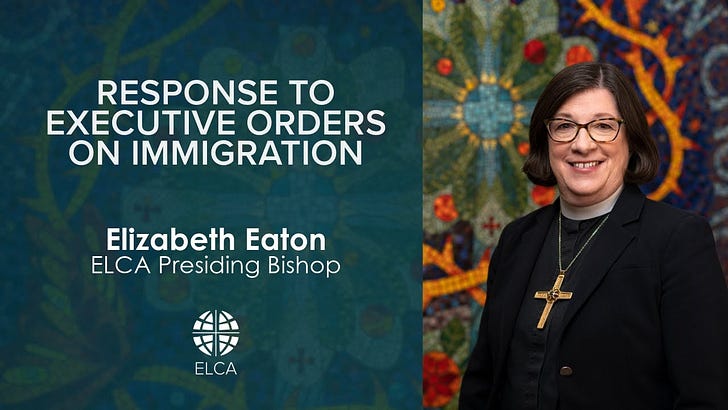This weekend, ELCA Presiding Bishop Elizabeth Eaton provided helpful information about why the ELCA has not joined the plaintiff lists suing the Trump Administration over its executive orders regarding immigration. Bishop Eaton assures Lutherans and all Americans that the ELCA’s absence from a plaintiff list is a matter of denominational polity, and in no way reflects lack of commitment to migrant justice.
One of the first executive orders signed by President Trump this year changed a longstanding U.S. Immigration and Customs Enforcement (ICE) policy. It had long been the case that ICE - by policy not law - would refrain from conducting raids or searches of schools, hospitals, and churches. This was intended to prioritize learning as a public good in schools, healthcare - especially emergency healthcare - as a public right, and worship as a protected right of people of faith. That has now changed, with this specific executive order ending this longstanding policy and signaling an intent to disrupt school, healthcare, and worship in order to carry out their duties.
While education and healthcare are not constitutionally protected rights, religious freedom is. As a result many denominations began to pile into several lawsuits against the Trump Administration for infringement of religious liberty. Many different Christian denominations are involved from Quakers to Episcopalians, Methodists to the United Church of Christ. Notably absent was the Evangelical Lutheran Church in America. Many took to social media recently to speculate about that absence, prompting the Presiding Bishop’s response - the ELCA, as a denominational body, doesn’t have standing in the case.
The ELCA’s structure is not altogether unique to denominational organizations, but isn’t particularly well understood. So, a quick breakdown: the ELCA is made up of three distinct but inter-related parts - congregations, synods, and the Churchwide Organization. Congregations are where most of our power - and notably for these purposes property - is held. Synods play an administrative and frequently pastoral role over the congregations and Churchwide plays an administrative role over all of this. In this way, Churchwide is a bit like a rideshare company (Uber, Lyft, etc.) in that churches are the predominant vehicle of their business, but they don’t actually own any churches. Not being a church or owning a church makes it a stretch to claim impact from a policy change that specifically impacted churches.
Can synods claim impact? Potentially, especially if they own churches or carry out worship services that might be disrupted. Can congregations claim impact? Absolutely, and there is no doubt that our congregations have standing in such a lawsuit. In fact, denominations with similar polity to the ELCA have joined the lawsuit by way of groups of congregations. Of course, any community seeking to join the lawsuit should speak with a lawyer to determine what options might be available to them.
While this is disappointing for many, Bishop Eaton makes a very important point - the participation of thousands of congregations in such a lawsuit would make a much larger and louder statement than the denominal body taking on a lawsuit on behalf of its congregations. We at Texas Impact know and profess that numbers do actually matter, whether it’s phone calls, registering opinions, postcard campaigns, or lawsuits defending religious freedoms.
Watch Bishop Eaton’s full statement below:




